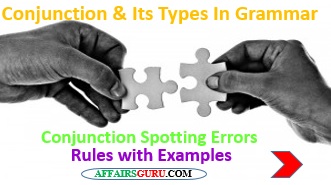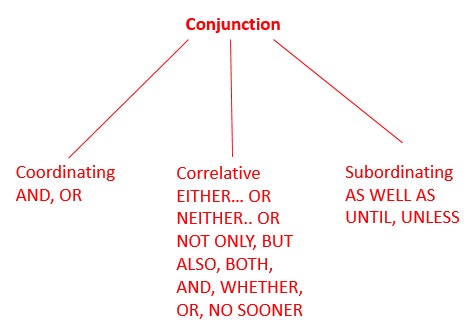Types of Conjunction In English Grammar With Examples PDF

What are Conjunction in English Grammar?
Conjunctions are words that link other words, phrases, sentences or clauses. For example, and, or, but, nor, for, yet, so, although, because, since, unless, when, while, where are some conjunctions. We can also simply call them as ‘joiner’.
How many types of conjunction are there in English Grammar?
Conjunctions have three types: Coordinating conjunctions, Correlative Conjunctions, and Subordinating Conjunctions.

Conjunction Type 1: Coordinating Conjunctions
Coordinating conjunctions are used to connect individual words, phrases, and independent clauses (of equal rank or importance).
Coordinating Conjunction List
and, or, but, so, nor, for, yet, also, either….or, neither…nor, etc are some of the Coordinating Conjunctions.
Types of Coordinating Conjunction
Coordinating Conjunction are further subdivided into three parts.
(a). Adversative
It is used to indicate opposition or contrast between two statements. Here- still, but, only, yet, whereas, while, nevertheless, etc are some of the adversative coordinating conjunctions.
Example
- The park is empty now, but it will be filled with children after school.
- I am slow, but I am fully sure about my destination.
- I will leave this place openly, only when she came.
- It was very hot, still I have not switched on fan.
(b) Cumulative or Copulative
It is used when we need to only add one statement to another. Here – and, both….and, not only….but also, as well as etc are some of the cumulative coordinating conjunctions.
Example
- He not only given food to beggar but also gave some money to him.
- Shankar is both smart and brave.
- I have to go office as well as bank.
- I filled the water in Cooler and my friend switched on the Cooler.
(c) Disjunctive or Alternative
It is used to indicate choice between two statements. Here – or, neither…nor, either….or, else, neither, nor, otherwise, etc are some of the Disjunctive or Alternative coordinating conjunctions.
Example
- Neither Shankar nor Rahul passed the exam.
- Aarti will be either in the room or on the roof.
- Go quick, else you will not catch the train.
- I wanted to walk in the forest or on the hill.
(d) Illative
It is used to express an inference in the sentence. Here – for, so, yet etc are some of the illative coordinating conjunctions.
Example
- I know you must be tired, so i will let you rest.
- I must to go office, for I have no other income source.
- Raju was very intelligent, yet his grades were very poor.
Error Spotting: Both ……….. and
Both Ram as well as Mohan are going for playing.(Incorrect)
Both Ram along with Mohan are going for bowling. (Correct)
Both Ram and Mohan are going for playing. (Correct)
Conjunction Type 2: Correlative Conjunctions
Correlative conjunctions are similar to Coordinating conjunctions. In this, a pair of conjunctions must be used together. These conjunctions are always used in pair as stated below.
(i) Either ……. or
(ii) Neither ….. nor
(iii) Not only …… but also
(iv) both …….. and
(v) although ……. yet
(vi) Whether ….. or
(vii) No sooner ….. than
(viii) Hardly/ Scarcely ….. when
(ix) The same ……. that
(x) Never ….. Or
(xi) as ….. as
(xii) rather…. than
(xiii)such / that
Example
- Both the green and the yellow colour are nice colours.
- Deepak can do either technical support or development.
- I either want ice cream or yogurt.
- Seeta is interested not only in singing but also in dancing.
Parallel Structure Problem
Either Noun …….. OR Noun
Either Verb ………. OR Verb
Either Noun …….. OR Verb (Incorrect)
Either Verb …….. OR Noun (Incorrect)
Neither the teacher or the student is keen on joining the dance. (Incorrect)
Neither the teacher nor the student is keen on joining the dance. (Correct)
Not only he goes to market but also stays there. (Incorrect)
He not only goes to market but also stays there. (Correct)
He is going not only to open a school but also a hospital. (Incorrect)
He is going to open not only a school but also a hospital. (Correct)
No sooner had he arrived then he was asked to leave again. (Incorrect)
No sooner had he arrived than he was asked to leave again.(Correct)
Hardly had I reached the station than the train left.(Incorrect)
Hardly had I reached the station when the train left.(Correct)
Note:
WH Questions: – when, why, who, whom, where, which, whose, what …..
that + (wh question word) ====Incorrect
He asked me that which was your favourite pen. (Incorrect)
Conjunction Type 3: Subordinating Conjunctions
It is used to join a clause to another in order to get full meaning. It joins a subordinate (dependent) clause to a main (independent) clause.
- Main Clause + Subordinate Clause
- Subordinate Clause + Main Clause
Subordinate clause cannot stand alone as a sentence as it does not provide complete meaning. It is generally depends on main clause. A main clause contains a subject and a verb. A main clause can stands alone as a sentence as it can provide you complete meaning.
Example
- Although it is raining, it is too hot today.
- We went to jungle where we saw a lion.
- As far as I know, Anil is a nice person.
- We played cricket while pitch was little wet.
Above In red are subordinate sentence.
Simple Subordinating Conjunction (Unless, Until, till, lest)
Compound Subordinating Conjunction (as soon as, as far as, )
Difference between till and Until and Unless
Until – used in sentences where time clause exists.
Unless – used in sentences where condition exists.
For example
You will fail in exam unless you study hard.
I want to stay here until she goes back.
I read till 10 : 00 AM.
Please wait in the lobby until they call your name.
Double Negative
Unless/ Until/ lest + not (Incorrect, not should not come after Unless/Until/lest)
lest (ऐसा न हो कि)
should come after lest only.
would, may, should not are all wrong if coming after lest.
You cannot demand all your articles unless you do not give advance notice.
Walk carefully, lest you would slip. (Incorrect)
Walk carefully, lest you should slip. (correct)
Compound Subordinating clause
than/then never come after As soon as/ As long as but can come comma (,)
As soon as we got out the car then it started raining.(Incorrect)
As soon as we got out the car, it started raining.(correct)
As soon as he wakes up then he checks his phone for messages.(Incorrect)
As soon as he wakes up, he checks his phone for messages.(Correct)
Then(show continuity) / Than (compare two thing with each other)
You wake up in the morning and then have breakfast.
I am older than you.
Conjunctions Spotting error
1. These workers are (a)/ neither honest nor (b)/ laborious or intelligent.(c)/ No error (d)
2. Such was her (a)/ behaviour that has (b)/ been expected. (c)/ No error (d)
3. He did not (a)/ see nor talk to (b)/ me last week.(c)/ No error (d)
4. They doubt that (a)/ he will win (b)/ the race. (c)/ No error (d)
5. This is the reason (a)/ due to he is not (b)/ working properly. (c)/ No error (d)
6. We were confident (a)/ and we will pass (b)/ the examination. (c)/ No error (d)
7. Run carefully (a)/ lest you (b)/ will fall. (c)/ No error (d)
8. Your cousin (a)/ looks (b)/ as him. (c)/ No error (d)
9. You need not fear (a)/ as soon as God (b)/ is with you. (c)/ No error (d)
10. I would have (a)/ supported him (b)/ but than I was bounded. (c)/ No error (d)
Answer
1. (c) use ‘nor‘ instead of ‘or‘
Rule 1 :
Neither – Nor
Either – Or
Not either – or
Either – or – or
Neither – nor – nor
2. (b) use ‘as‘ instead of ‘that‘
Rule 2 :
Such – As [General Sense]
Such – That [Result/Conclusion]
For Example. Such was her behaviour that everyone disliked her.
3. (b) use ‘or‘ instead of ‘nor‘
Rule 3 :
Not/Never – or
Neither – nor
4. (a) use ‘if/whether‘ instead of ‘that‘
Rule 4 :
Doubt/ Doubtful – if/whether [Affirmative]
Doubt/ Doubtful – that [Negative/ Interrogative]
5. (b) use ‘that‘ instead of ‘due to‘
Rule 5 :
The reason/ The reason why – that
6. (b) use ‘that‘ instead of ‘and‘
Rule 6 :
Use ‘that’ with adjectives
Confident, pleased, worried, possible, angry, anxious, aware, clear, probable, conscious, happy, important, lucky, natural, obvious, true, certain, convinced
7. (c) use ‘should‘ instead of ‘will‘
Rule 7 :
Lest – should
Otherwise – will/shall
8. use ‘like‘ instead of ‘as‘
Rule 8 :
As + Subject + Verb
Like + Subject
Example. He works as his father does.
9. (b) use ‘as long as‘ instead of ‘as soon as‘
Need not or Dare not ] -> V1 (not To + V1)
Need or Dare ] -> To + V1 (not only V1)
Rule 9 :
As soon as – [At the moment]
As long as – [sense of while]
10. (c) use ‘but that‘ instead of ‘but than‘
Rule 10 :
We can use ‘But that’ in place of ‘except that’ because they both give the same sense.
Conjunction & Its Types With Examples PDF
You can download the Conjunction & Its Types PDF by clicking on below link.
Conjunction & Its Types With Example PDF
Conjunction Spotting Error PDF
You can also download the Conjunction Spotting Error PDF by clicking on below link.
Conjunction Spotting Error PDF
If you have any questions or doubts, please drop your comment below in box.
All the best for your upcoming exam!
You can join or visit at Facebook Page or Twitter for always keep in touch with further updates.
Read more articles….
